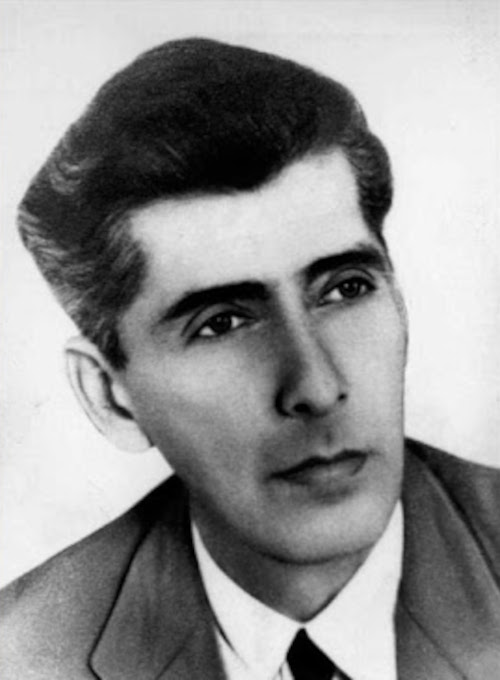Horacio Hidrovo Velásquez (Santa Ana, May 20, 1902 – Portoviejo, April 19, 1962) was an Ecuadorian poet, novelist, and short story writer. His most celebrated work, “Un Hombre y un Río” (1957), encapsulates his profound connection to the Ecuadorian coastal life, blending vivid narrative with social commentary. Velásquez played a significant role in the cultural sphere, serving as the President of the House of Ecuadorian Culture in Manabí in 1957, where he was instrumental in promoting the arts and literature.
Early Life and Education
Born on May 20, 1902, in Santa Ana, Manabí Province, Ecuador, Horacio Hidrovo Velásquez was immersed from an early age in an environment rich in culture and natural beauty. The son of Eduardo Hidrovo G. and Orfilia Velásquez Castro, he grew up in a family that highly valued education and the arts, which played a significant role in shaping his literary path. His initial education was marked by the influence of his family and the lush landscapes of his homeland, which would later emerge as recurring themes in his work.
Velásquez’s formal schooling took place in Manabí, where he was exposed to a wide range of literary works through his family’s extensive library, laying a strong foundation for his future in writing. His secondary education at the Colegio Nacional Olmedo in Portoviejo was pivotal; it was here that his literary talent began to flourish under the guidance of teachers who nurtured his developing skills. This period was instrumental in Velásquez’s growth as a writer, instilling in him a deep appreciation for Ecuador’s cultural and environmental richness, which would become central to his literary career.
Literary Career
Horacio Hidrovo Velásquez established himself as a pivotal figure in Ecuadorian literature through his prolific output of novels, poetry, and essays that deeply explored the fabric of Ecuadorian life. His debut with “Libro Prematuro” (1920) marked the beginning of a distinguished literary journey, wherein he adeptly captured the essence of his homeland’s landscapes and people.
One of his most celebrated novels, “Un Hombre y un Río” (1957), exemplifies his talent for intertwining human emotions with the natural world, offering profound insights into the lives of Ecuadorians. Other significant works include “La mujer que nació así” (1927), a novel that further cemented his reputation, and “Jinetes en la Noche” (1948), which showcased his versatility as a storyteller.
Velásquez’s contributions were recognized in 1961 when he was honored with the Educational Merit Award by the Ecuadorian government, acknowledging his influence on Ecuadorian culture and education. His literary legacy was further highlighted when his son published “Canción de las Voces Infinitas” (1975). This collection, although not exhaustive due to the scattering of Velásquez’s poems in numerous magazines and publications, offered a glimpse into the depth and breadth of his poetic vision.
Political and Cultural Engagement
Horacio Hidrovo Velásquez intertwined his literary career with a fervent dedication to political and cultural causes. In 1945, his political activism took a prominent turn when he was elected as a Deputy representing coastal workers, a role through which he pursued labor rights and social equity. This position reflected his broader commitment to using his voice for the betterment of the working class and underlined his belief in the power of political action to drive social change.
Beyond the realm of politics, Velásquez’s cultural contributions were equally significant. In 1957, he assumed the presidency of the Manabí branch of the House of Ecuadorian Culture, where he was instrumental in bridging cultural initiatives with societal concerns. Under his leadership, the organization thrived, becoming a pivotal platform for promoting the arts and cultural awareness across Ecuador. One of his notable achievements was the organization of the “Primer Festival Nacional de la Poesía,” an event that celebrated Ecuadorian poetry and fostered a national dialogue around cultural identity and heritage.
Personal Life
Horacio Hidrovo Velásquez’s personal life was closely entwined with his cultural and intellectual pursuits, significantly shaped by his familial relationships. His marriage to Lila Peñaherrera Encalada bore him two children, including Horacio Hidrovo Peñaherrera (1931-2012), who would carry on his father’s literary legacy as a poet, underscoring the profound influence Velásquez had on nurturing a rich cultural environment within his own family.
Selected Works
- “Libro Prematuro” (1920)
- “Cause”
- “Jinetes en la Noche” (1948)
- “Dimensión del Dolor” (1951)
- “Pecado de Agua Clara”
- “Un Hombre y un Río” (1957)
- “La mujer que nació así” (1927)

